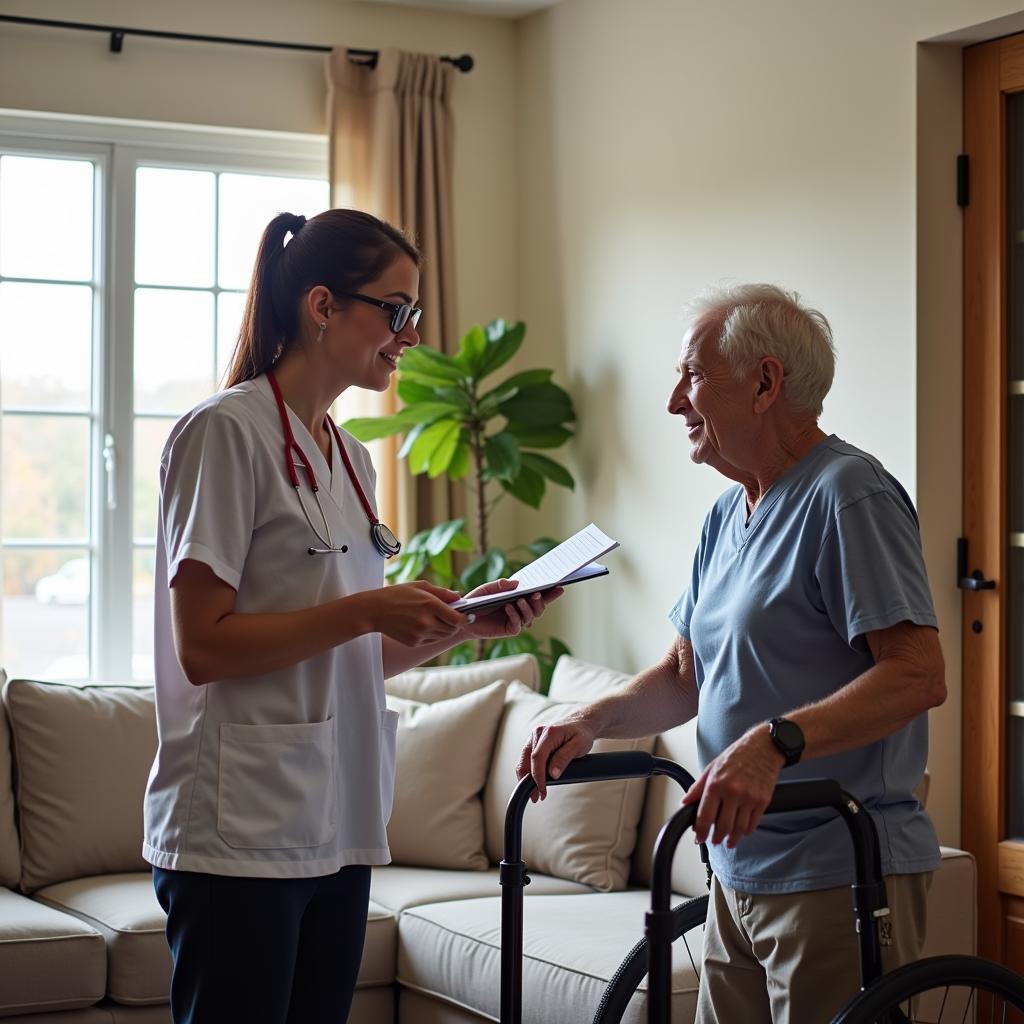Fall risk assessment tools are crucial for home health care, helping to identify individuals at risk and implement preventative measures. In the comfort of their own homes, these tools offer a practical way to assess potential hazards and mitigate the risk of falls, promoting safety and well-being for those receiving care.
Understanding the Importance of Fall Risk Assessment Tools in Home Health Care
 Fall Risk Assessment in Home Health Care
Fall Risk Assessment in Home Health Care
Falls are a significant concern, particularly for older adults and those with underlying health conditions. A fall can lead to serious injuries, reduced mobility, and a decreased quality of life. home care risk assessment tool plays a vital role in proactively identifying potential fall hazards in the home environment. By assessing factors like balance, medication use, and environmental hazards, healthcare professionals can develop personalized care plans to minimize fall risks.
Key Benefits of Using a Fall Risk Assessment Tool
- Early Identification: Identify individuals at risk before a fall occurs.
- Personalized Care: Tailor interventions to individual needs and circumstances.
- Improved Safety: Reduce the incidence of falls and related injuries.
- Enhanced Independence: Promote safe mobility and maintain independence.
- Peace of Mind: Provide reassurance to both patients and their families.
Different Types of Fall Risk Assessment Tools
Several fall risk assessment tools are available for home health care, each with its own strengths and limitations. Some common tools include:
- Morse Fall Scale: A widely used tool that assesses factors like history of falling, secondary diagnosis, ambulatory aid, IV/Heparin lock, gait/transferring, and mental status.
- Hendrich II Fall Risk Model: Considers factors such as confusion/disorientation/impulsivity, symptomatic depression, altered elimination, dizziness/vertigo, gender, antiepileptics, and benzodiazepines.
- Timed Up and Go (TUG) Test: Measures the time it takes for an individual to rise from a chair, walk a short distance, turn, walk back, and sit down.
- Berg Balance Scale: Assesses static and dynamic balance through a series of tasks.
Choosing the right tool depends on the specific needs of the patient and the resources available to the healthcare provider. [fall risk assessment tool for home health care](https://diagfixpro.com/fall risk assessment tool for home health care/) can be particularly useful for home health care settings as it focuses on environmental factors within the home.
How to Implement a Fall Risk Assessment Tool in Home Health Care
Implementing a fall risk assessment tool effectively involves the following steps:
- Select the appropriate tool: Choose a tool that is validated, easy to use, and relevant to the patient’s condition.
- Conduct a thorough assessment: Gather information about the patient’s medical history, medications, mobility, and home environment.
- Develop a personalized care plan: Based on the assessment results, create a plan that addresses identified risk factors.
- Educate the patient and family: Explain the importance of fall prevention and provide practical tips for improving home safety.
- Regularly re-assess: Monitor the patient’s progress and adjust the care plan as needed. falls risk assessment tool care home provides a structured framework for ongoing assessment and intervention.
“A comprehensive fall risk assessment is the cornerstone of effective fall prevention in home health care,” says Dr. Emily Carter, a geriatric specialist. “By identifying and addressing individual risk factors, we can empower patients to maintain their independence and safety at home.”
Conclusion
Fall risk assessment tools are essential for promoting safety and well-being in home health care. By utilizing these tools, healthcare professionals can identify individuals at risk, develop personalized care plans, and implement effective fall prevention strategies. Regular assessment and ongoing communication are key to minimizing fall risks and ensuring the best possible outcomes for patients receiving care at home. Remember, health care risk assessment tool is a crucial step towards a safer home environment.
FAQ: (Coming soon)
Need help? Contact us via WhatsApp: +1(641)206-8880, Email: [email protected] or visit us at 910 Cedar Lane, Chicago, IL 60605, USA. We have a 24/7 customer service team.
